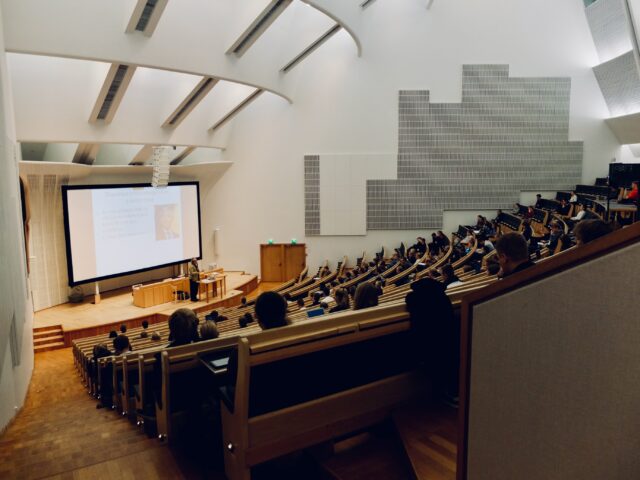An online post proposing the name “John Horgan University” for the collaborative educational campus under construction in Langford has reportedly gone viral, drawing thousands of views and interactions on social media. Shortly after the announcement of the passing of former Government of British Columbia Premier John Horgan, a community member in Langford created a post proposing the name for the campus. The partners developing the campus–BC, Camosun College, Royal Roads University, and the University of Victoria–told CTV News that Horgan was “instrumental” in making the campus possible and indicated that they would “take this heartfelt sentiment into consideration.” The collaborative campus is set to open its doors next spring.

Top Ten News
November 15, 2024
Ontario Tech University has launched the “Tech with a Conscience” fundraising campaign, a $250M initiative that aims to support the responsible use of technology. “This $250-million endeavour will supercharge the university’s research activities, accelerate campus expansion, and most importantly, nurture the next generation of ethical leaders who will tackle tomorrow’s challenges, from climate change to equitable health care,” read an Ontario Tech release. The university launched the campaign with a video that blends AI, computer-generated imagery, and live-action footage to demonstrate how “Tech with a Conscience” can be put into action.
The Government of Canada has shared further details on how a $638M investment into science and research will be distributed to postsecondary institutions across the country. The investment is expected to benefit researchers at more than 100 institutions in Canada. The funds will be distributed through programs such as the Research Support Fund (over $452M), the Canada Research Chairs program ($182M), and Canada Foundation for Innovation’s John R Evans Leaders Fund ($3.5M). “By supporting our world-class postsecondary institutions and their diverse teams of researchers, we’re fueling the innovations that drive progress and competitiveness,” stated Canada Minister of Innovation, Science and Industry François-Philippe Champagne.
The University of Regina, University of Saskatchewan, Atomic Energy of Canada Ltd (AECL), and Canadian Nuclear Laboratories Limited (CNL) have signed a Memorandum of Agreement to collaborate on the advancement of nuclear research and innovation. The MOA establishes a collaborative framework on key areas such as joint research projects, faculty exchanges, and specialized educational programs. The agreement also will enable shared access to infrastructure and expertise. Through the agreement, URegina and USask have additionally joined CNL’s Academic Partnership Program, which facilitates partnerships between universities to develop talent, expand research networks and programs, and benefit from shared expertise and infrastructure. USask says that it is one of Western Canada’s first universities to join the program.
MacEwan University’s MacEwan Means Business campaign has received a $1.5M donation from Weidner Apartment Homes in support of the School of Business building project. The new space—which is anticipated to be complete by 2027—will expand MacEwan’s offerings with a trading simulation lab, new programming, and additional study spaces and computer labs. “This gift provides a strong foundation for our campaign, helping us continue to build momentum, and reinforces their nearly 10-year relationship with our university,” said MacEwan President Dr Annette Trimbee.
Mohawk College and ECO Canada have partnered to form the Centre for Applied Learning in Sustainability, which will enhance workforce development in Canada’s environmental sector. The partnership will address the sector’s skills gap through training solutions that prepare individuals to work in emerging areas of the blue and green economies. Mohawk will complete course development, delivery, and program management, while ECO Canada will be responsible for marketing, supporting certification and employment resources, and National Occupational Standards. Programming will include micro-credentials, certificates, and pathway programs leading to diplomas and bachelor’s degrees.
Clinical psychologist Michelle Keiski has filed a lawsuit against the University of Manitoba and Shared Health, alleging that she was fired from her joint position with the organizations without cause after making a complaint to the Psychological Association of Manitoba. Keiski lodged a complaint about UManitoba’s Max Rady College of Medicine and was reportedly subsequently placed on a one-month administrative leave and later terminated without cause. Keiski is now seeking an unspecified amount in damages for her termination. The allegations have not been tested in court and representatives of Shared Health and UManitoba declined comment in light of the ongoing litigation.
Western University has retrofitted the Siebens Drake Research Institute to cut carbon emissions. These changes were completed as part of Western’s Deep Energy Retrofit Program, which aims to retrofit older campus buildings to improve energy efficiency and reduce emissions. Work included connecting the building to Western’s energy loop so that excess heat can be redistributed to other buildings and to Western’s district chilling cool network so that it has a backup cooling source. This retrofit is expected to reduce the building’s electricity consumption by 20% and steam consumption by 75%.
Concordia University has officially launched the Institute for Research on Migration and Society (IRMS). This interdisciplinary institute will bring evidence-based scholarship to the discussions around immigration and migration in Canada, focusing on topics such as how immigrants adapt to and improve Canadian society. “This institute brings the great minds and valued programs of study focused on migration at Concordia under one banner,” said Concordia IRMS Director Mireille Paquet. “As the first fully bilingual research hub on migration in Canada, IRMS is uniquely positioned to contribute to knowledge and policy. It can also bridge immigration politics across provinces and with the Government of Canada.”
Humber Polytechnic, OCAD University, and Queen’s University each recently launched new short-term training programs to support working professionals. Humber launched the free 16-week Connecting to Careers in Agricultural Technology within Vertical Farming program for learners who are hoping to advance or launch a career in vertical farming. The polytechnic also recently relaunched its Indigenous Pension Plan Administration Certification. OCADU launched a nine-month art and design training course for surgeons. “Both in surgery and in art, we think with our hands,” explained OCADU Program Co-developer Dr John Semple. “I believe that this type of experiential learning in art for surgeons will foster creativity and improvisation in their research and clinical practice.” Queen’s launched a Certificate in Professional Impact Analysis for working professionals who would like to develop the skills to measure and communicate their organization’s impact.
